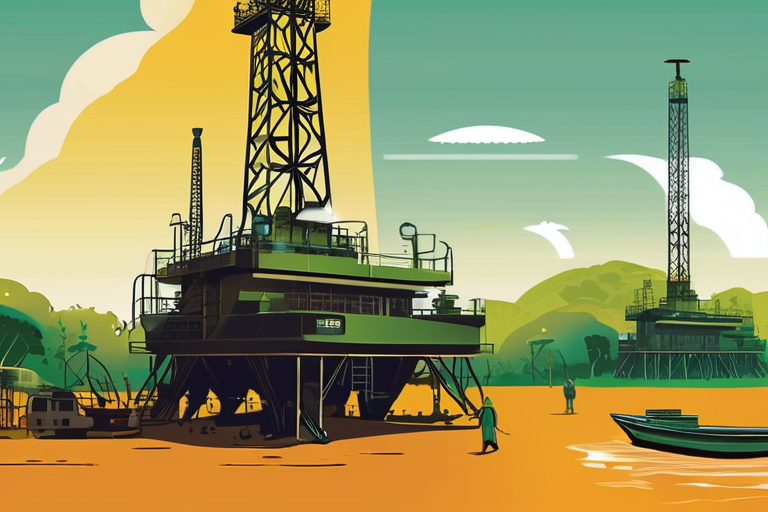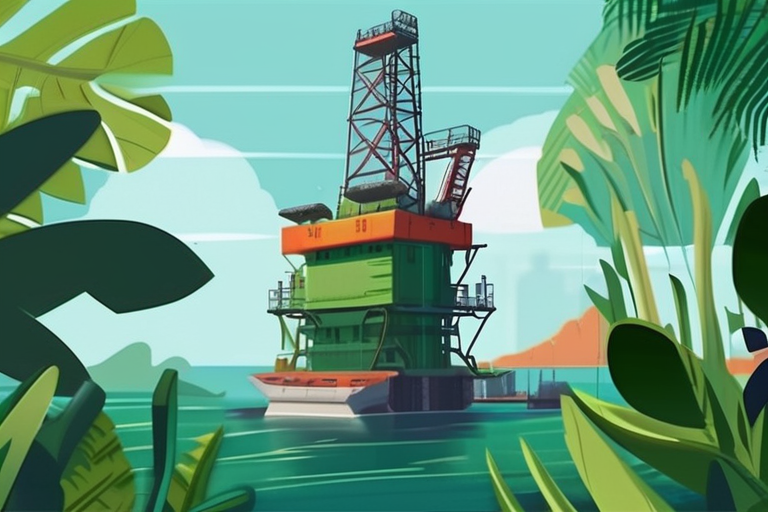Brazil Greenlights Oil Drilling in Amazon Amid Environmental Concerns
In a move that has sparked widespread criticism from environmentalists, Brazil's government has given the green light to oil drilling in the Amazon region. Petrobras, the state-owned oil company, has been granted permission to explore for oil near the mouth of the Amazon River, despite concerns over the impact on the world's largest tropical rainforest.
According to a statement released by Petrobras, the company will begin drilling immediately and expects the operation to last five months. The project has been in the works since 2017, with Petrobras facing opposition from environmental groups who argue that oil exploration could harm the region's delicate ecosystem.
"This decision is a betrayal of President Lula's commitment to protecting the Amazon," said Maria Rodriguez, a spokesperson for the Amazon Watch organization. "We urge the government to reconsider this decision and prioritize the preservation of the Amazon rainforest."
The move has also raised eyebrows ahead of next month's UN climate talks in Belem, Brazil, where world leaders will gather to discuss strategies for reducing greenhouse gas emissions.
Brazilian President Luiz Inácio Lula da Silva has been a vocal advocate for environmental protection, but his administration's decision to allow oil drilling in the Amazon has sparked accusations that he is prioritizing economic interests over environmental concerns.
"The president's image as a global leader on climate change is at risk," said Paulo Adario, a senior campaigner with Greenpeace. "This decision sends a signal that Brazil is not serious about reducing its carbon footprint and protecting the Amazon."
The Foz de Amazonas region where Petrobras will be drilling is home to a diverse array of wildlife, including dolphins, manatees, and over 1,000 species of birds.
Environmental watchdog Ibama has given Petrobras permission to drill after the company met all the necessary requirements for environmental licensing. However, critics argue that the process was flawed and did not adequately consider the potential impacts on the environment.
The decision to allow oil drilling in the Amazon has sparked a heated debate over the balance between economic development and environmental protection. While some argue that Brazil needs to exploit its natural resources to fuel economic growth, others contend that the risks associated with oil exploration outweigh any potential benefits.
As the world's attention turns to Belem for the UN climate talks, this decision serves as a stark reminder of the challenges facing countries in balancing economic development with environmental protection. The implications of this decision will be closely watched by policymakers and environmentalists alike.
Background:
The Amazon rainforest is one of the most biodiverse ecosystems on the planet, covering over 5.5 million square kilometers across nine countries in South America. Brazil's portion of the forest is home to an estimated 10% of all known plant and animal species. The region is also a critical carbon sink, absorbing massive amounts of CO2 from the atmosphere.
Additional Perspectives:
"This decision is a wake-up call for world leaders to take action on climate change," said Dr. Thomas Lovejoy, a renowned biologist and Amazon expert. "The Amazon is not just a natural wonder; it's also a critical component of the global carbon cycle."
"We urge the Brazilian government to reconsider this decision and prioritize the preservation of the Amazon rainforest," said Maria Rodriguez, spokesperson for Amazon Watch.
Current Status:
Petrobras has begun drilling operations in the Foz de Amazonas region, with an estimated five-month timeline. The company expects to extract oil from the region's subsurface deposits, which are believed to hold significant reserves.
The decision to allow oil drilling in the Amazon has sparked widespread criticism from environmental groups and raised questions about Brazil's commitment to protecting the world's largest tropical rainforest. As the UN climate talks approach, this decision serves as a stark reminder of the challenges facing countries in balancing economic development with environmental protection.
*Reporting by Theguardian.*



 Hoppi
Hoppi

 Hoppi
Hoppi

 Hoppi
Hoppi

 Hoppi
Hoppi

 Hoppi
Hoppi

 Hoppi
Hoppi











